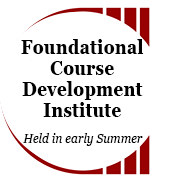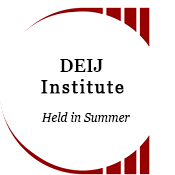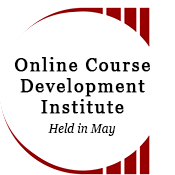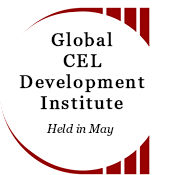 The Foundational Course Development Institute meets for five 3-hour morning sessions over one week to implement a backward design and UDL approach to develop a new course or revise an existing course. By the end of the Institute, participants can expect to have determined learning outcomes for their students and outlined a major final assignment (or exam) that gathers evidence about the extent to which students have achieved those outcomes. They will also have the opportunity to lay out a basic calendar for the course they are developing and to map out and align assignments and grading strategies that motivate students toward the learning outcomes they have delineated.
The Foundational Course Development Institute meets for five 3-hour morning sessions over one week to implement a backward design and UDL approach to develop a new course or revise an existing course. By the end of the Institute, participants can expect to have determined learning outcomes for their students and outlined a major final assignment (or exam) that gathers evidence about the extent to which students have achieved those outcomes. They will also have the opportunity to lay out a basic calendar for the course they are developing and to map out and align assignments and grading strategies that motivate students toward the learning outcomes they have delineated.
Recommended for faculty who are new to these approaches or would like the accountability and structure of guided course design.

The Diversity, Equity, Inclusion, and Justice (DEIJ) Institute offers an extended opportunity to learn more about inclusive and equitable teaching, and to make concrete plans for integrating these concepts into courses. Topics include inclusive course/syllabus design, equitable course policies, inclusive assignments and equitable grading, inclusive classroom activities and environments, building a sense of belonging, and more.
Recommended for faculty who wish to focus on equitable and inclusive approaches to course design and instruction.
 The Online Course Development Institute (OCDI) helps instructors design, develop, and learn how to teach an online course. Participants meet in person for five 4-hour sessions over a 5-day period in May, then complete asynchronous activities online over the summer to help them develop further skills and become comfortable interacting and teaching in the online environment. By the end of the institute, participants will have a plan in place for developing and teaching their course, be able to apply quality standards to review and improve online and hybrid courses, and be able to use backward design principles in all their courses and lessons.
The Online Course Development Institute (OCDI) helps instructors design, develop, and learn how to teach an online course. Participants meet in person for five 4-hour sessions over a 5-day period in May, then complete asynchronous activities online over the summer to help them develop further skills and become comfortable interacting and teaching in the online environment. By the end of the institute, participants will have a plan in place for developing and teaching their course, be able to apply quality standards to review and improve online and hybrid courses, and be able to use backward design principles in all their courses and lessons.
 The Global Community-Engaged Course Development Institute helps instructors design and develop new, high quality community-engaged learning courses with a global learning focus. The goal of this Institute is to prepare educators to teach community-engaged courses with global/international perspectives. Applicants will join in three stages of course development from May to August, starting with a 3-day virtual workshop where participants will explore the theory and practice of community-engaged learning and global learning. By the end of the institute, participants will have a plan in place for developing and teaching their course.
The Global Community-Engaged Course Development Institute helps instructors design and develop new, high quality community-engaged learning courses with a global learning focus. The goal of this Institute is to prepare educators to teach community-engaged courses with global/international perspectives. Applicants will join in three stages of course development from May to August, starting with a 3-day virtual workshop where participants will explore the theory and practice of community-engaged learning and global learning. By the end of the institute, participants will have a plan in place for developing and teaching their course.
This institute is a partnership between the CITL Service-Learning Program (SLP) and The Hamilton Lugar School of Global and International Studies Center for the Study of Global Change.


 The Foundational Course Development Institute meets for five 3-hour morning sessions over one week to implement a backward design and UDL approach to develop a new course or revise an existing course. By the end of the Institute, participants can expect to have determined learning outcomes for their students and outlined a major final assignment (or exam) that gathers evidence about the extent to which students have achieved those outcomes. They will also have the opportunity to lay out a basic calendar for the course they are developing and to map out and align assignments and grading strategies that motivate students toward the learning outcomes they have delineated.
The Foundational Course Development Institute meets for five 3-hour morning sessions over one week to implement a backward design and UDL approach to develop a new course or revise an existing course. By the end of the Institute, participants can expect to have determined learning outcomes for their students and outlined a major final assignment (or exam) that gathers evidence about the extent to which students have achieved those outcomes. They will also have the opportunity to lay out a basic calendar for the course they are developing and to map out and align assignments and grading strategies that motivate students toward the learning outcomes they have delineated. 
 The Online Course Development Institute (OCDI) helps instructors design, develop, and learn how to teach an online course. Participants meet in person for five 4-hour sessions over a 5-day period in May, then complete asynchronous activities online over the summer to help them develop further skills and become comfortable interacting and teaching in the online environment. By the end of the institute, participants will have a plan in place for developing and teaching their course, be able to apply quality standards to review and improve online and hybrid courses, and be able to use backward design principles in all their courses and lessons.
The Online Course Development Institute (OCDI) helps instructors design, develop, and learn how to teach an online course. Participants meet in person for five 4-hour sessions over a 5-day period in May, then complete asynchronous activities online over the summer to help them develop further skills and become comfortable interacting and teaching in the online environment. By the end of the institute, participants will have a plan in place for developing and teaching their course, be able to apply quality standards to review and improve online and hybrid courses, and be able to use backward design principles in all their courses and lessons. The
The